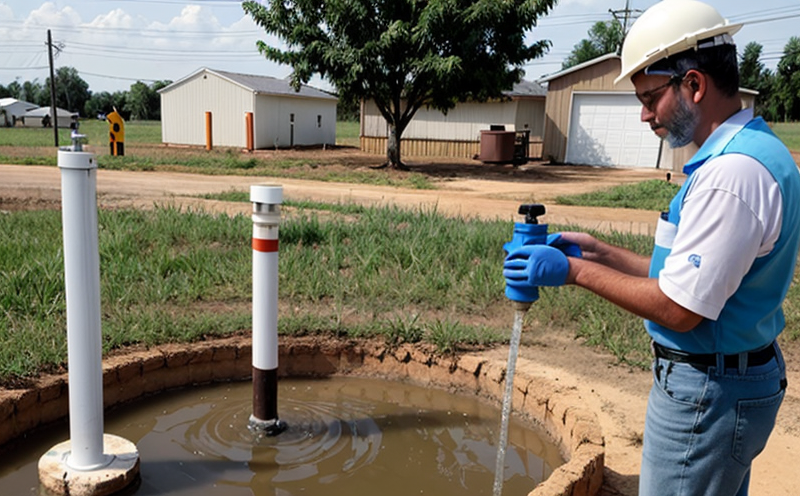Groundwater Quality Testing
The testing of groundwater quality is essential in ensuring public health and environmental sustainability. Groundwater forms a significant part of our water resources and plays a crucial role in agriculture, drinking water supply, and ecosystems. The quality of this vital resource can be impacted by various factors including natural processes, human activities, and contamination. It is therefore critical to monitor its parameters regularly.
Groundwater testing involves the analysis of numerous physical, chemical, microbiological, and radiological properties. These tests help in understanding the baseline conditions of groundwater, identifying potential hazards, and assessing compliance with regulatory standards. The results are vital for stakeholders who need to make informed decisions regarding water management, pollution control, and resource protection.
Our laboratory specializes in providing comprehensive groundwater quality testing services tailored to meet industry-specific requirements. We employ advanced analytical techniques and state-of-the-art equipment to ensure accurate and reliable test outcomes. Our team of experts is committed to delivering high-quality results within strict timelines.
The importance of groundwater quality testing cannot be overstated. It helps in:
- Ensuring compliance with regulatory standards
- Promoting public health by preventing waterborne diseases
- Sustaining ecosystems and biodiversity
- Supporting agricultural productivity through safe irrigation practices
- Managing water resources efficiently for sustainable development
- Reducing environmental impacts from industrial activities
- Monitoring remediation efforts in contaminated sites
Our laboratory adheres to international standards such as ISO 17025, ensuring that our testing methods are accurate and reliable. The data we provide can be used by regulatory bodies, businesses, and environmental agencies for strategic planning and decision-making.
Scope and Methodology
The scope of groundwater quality testing includes a wide range of parameters that influence the overall quality of this resource. Our laboratory uses advanced analytical techniques to measure these parameters accurately and reliably. Below is a detailed overview of the key tests performed:
| Parameter | Description | Testing Methodology |
|---|---|---|
| pH | Indicates acidity or basicity of groundwater. | pH meters and titration methods are used. |
| Total Dissolved Solids (TDS) | Metric for quantifying the concentration of dissolved substances in water. | Ionic Conductivity Meter and Filtration. |
| Electrical Conductivity (EC) | Measures the ability of a solution to conduct electricity. | Spectrophotometry and Ion-selective Electrodes. |
| Dissolved Oxygen (DO) | Indicates the amount of oxygen dissolved in water, crucial for aquatic life. | Absorption Spectroscopy and Amperometric Sensors. |
| Biochemical Oxygen Demand (BOD) | Measures the amount of oxygen consumed by microorganisms breaking down organic matter. | Biological incubation methods using standardized protocols. |
| Total Coliform Bacteria | Indicates potential presence of pathogenic bacteria in water. | Culture-based and quantitative PCR methods. |
| Nitrate and Nitrite Nitrates | Key indicators for assessing nitrogen pollution from agricultural runoff or industrial waste. | Azide-Nitro Blue Tetrazolium Chloride (NBT) Reduction Method. |
| Total Suspended Solids (TSS) | Measures the amount of solid matter present in water, including particles like clay and silt. | Filtration methods followed by gravimetric analysis. |
In addition to these parameters, our laboratory also conducts tests for specific contaminants such as heavy metals (Arsenic, Lead, Cadmium), pesticides, hydrocarbons, and other organic compounds. Each test follows internationally recognized standards like ISO 14680 and EN 250.
Environmental and Sustainability Contributions
The work we do in groundwater quality testing contributes significantly to environmental sustainability by:
- Preventing Groundwater Contamination: By identifying contaminants early, we help prevent further pollution of this crucial resource.
- Sustaining Ecosystems: Healthy groundwater supports diverse ecosystems and promotes biodiversity.
- Ensuring Public Health: Safe drinking water is essential for public health. Our testing ensures that the water meets safety standards set by regulatory bodies.
- Promoting Agricultural Productivity: Groundwater plays a vital role in agriculture, and safe irrigation practices supported by our testing ensure better crop yields.
- Supporting Sustainable Development Goals (SDGs): Our work aligns with the UN's SDG 6 on clean water and sanitation.
- Maintaining Regulatory Compliance: By ensuring compliance, we help stakeholders avoid legal penalties and maintain a good reputation.
In conclusion, groundwater quality testing is not just about measuring parameters; it’s about protecting the environment and public health. Our laboratory plays an integral role in this mission by providing accurate, reliable data that can be trusted for critical decision-making processes.
Competitive Advantage and Market Impact
Our expertise in groundwater quality testing sets us apart from competitors due to several key factors:
- Comprehensive Testing Capabilities: We offer a wide range of tests covering all major parameters, ensuring we meet diverse client needs.
- Adherence to International Standards: Our commitment to ISO 17025 and other internationally recognized standards ensures the highest level of reliability in our test results.
- Advanced Analytical Techniques: Leveraging cutting-edge technology, we deliver accurate and timely results that are essential for informed decision-making.
- Experienced Team: Our team comprises highly skilled professionals with extensive experience in groundwater quality testing.
- Custom Solutions: We tailor our services to meet the specific needs of each client, ensuring they receive solutions that are relevant and effective.
- Economic Impact: By promoting sustainable practices and ensuring compliance, we contribute to a healthier economy by minimizing costs associated with pollution and non-compliance.
The market for groundwater quality testing is growing due to increasing concerns over water scarcity and contamination. Our laboratory is well-positioned to capitalize on this trend by offering superior services that meet the evolving needs of our clients.





